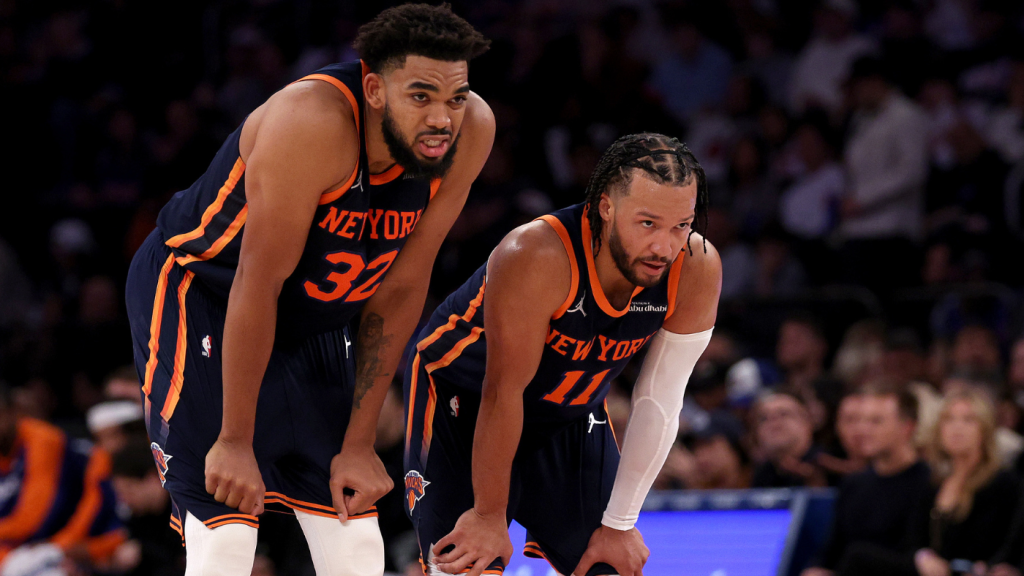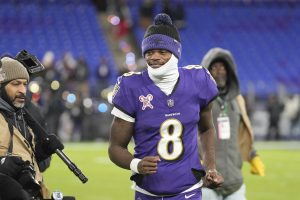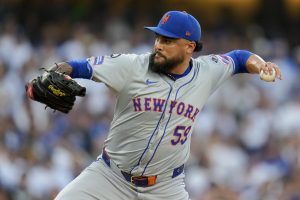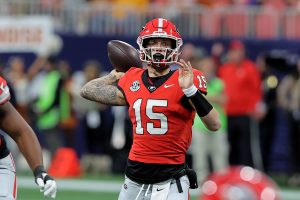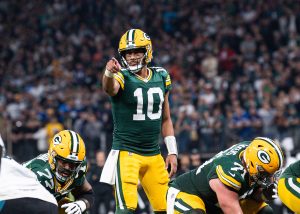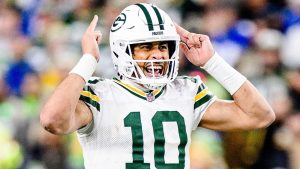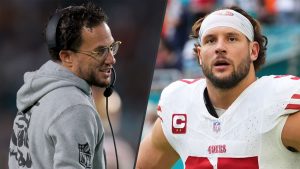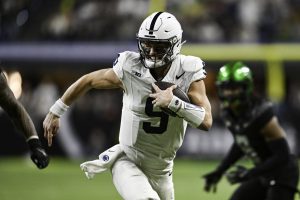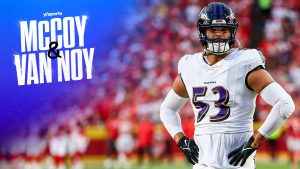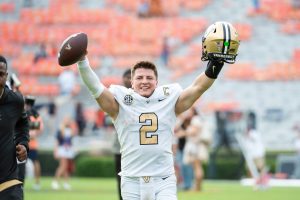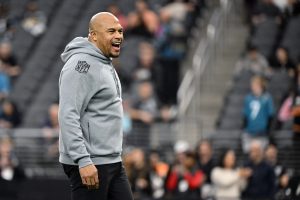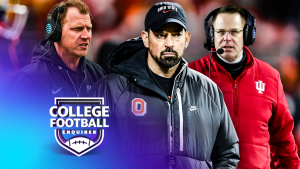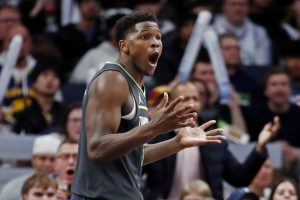The Knicks, Celtics, Cavs and Bucks account for 10 of these 12 selections
Getty Images
The creation of the NBA Cup has created a relatively clean divide in the season’s schedule. The first third or so of the season is built around the Cup. The last third is the playoff push. But that middle third? That’s the build up to All-Star, the point in the season in which we start to seriously evaluate the league’s best players and reconsider the hierarchy.
The All-Star format this year is going to be different. Rather than two teams, the NBA is dividing 24 All-Stars into three, and they, along with the winning team from the Rising Stars Challenge, will duke it out in a four-team tournament. We’re still more than a month away from the actual selection of 2024-25 All-Stars, but now that the Cup is in the rearview mirror, it’s time to start considering who’s going to be playing in San Francisco in February.
To that end, we’re going to pick All-Star teams for both conferences based on the two-month sample we currently have. The goal of this exercise will be to choose the 12 players who I expect to deserve selection when the real teams are chosen based on their performance so far. This means that I will not be beholden to anticipated voting results, but that injuries that will likely cost a player too many games will ultimately count.
Essentially, if things continue on their current path, these would be the 12 players I would select in each conference. We’ll be retaining the typical roster format: two guards and three frontcourt players starting, the same split on the bench for the first five reserve slots, and then, for the last two, anything goes. We’re tackling the Eastern Conference today and the West tomorrow, so without further ado, let’s dive right in.
Starters
G: Jalen Brunson, KnicksG: Donovan Mitchell, CavaliersFC: Jayson Tatum, CelticsFC: Giannis Antetokounmpo, BucksFC: Karl-Anthony Towns, Knicks
Let’s start with our two no-brainers. Giannis Antetokounmpo and Jayson Tatum are the East’s two somewhat viable MVP candidates at this point. There’s no world short of injuries in which they are not named starters.
Antetokounmpo is the conference’s leading scorer, and is on track to shatter his own career-high in scoring and field goal percentage. Though his 3-point shot never quite came around, Antetokounmpo is having a monster mid-range season. Only DeMar DeRozan, Brandon Ingram and Devin Booker have taken more mid-range shots than he has this season, and the 46.3% of them he’s made puts him squarely in superstar territory. His defense isn’t quite what it used to be, but that level of scoring dominance coupled with his typical playmaking and rebounding makes him an obvious All-Star starter.
Tatum’s case is similarly straightforward. He ranks fourth in the conference in scoring, 11th in rebounding and 17th in assists. His shooting has cooled off a tad, but his defense remains as strong as ever, and he’s leading the universally agreed upon championship favorite. For years he has been arguably the NBA’s most adaptable superstar. When Boston needs him to score 40, he scores 40. When it needs him to guard a center, he guards a center. There are a few players he’ll just never catch statistically, but the Celtics get to be the Celtics because they don’t have to stylistically conform to the needs of a single player in the ways that many other contenders need to. As long as Tatum remains a skeleton key to the flexibility that makes Boston so special, he’ll remain an easy choice for All-Star starter.
It’s a three-man race for the two guard spots here, and Jalen Brunson nabs the first with a bit of breathing room. He and Damian Lillard have the slight statistical edge on Donovan Mitchell, but Brunson has been more efficient than Lillard, he plays for the better team, and unlike Lillard, he is a No. 1 option. Add all of that together and he takes the first spot. The battle between Mitchell and Lillard is where things get interesting.
Lillard scores more than Mitchell, and he has a sizable lead in assists as well. Does that necessarily mean he’s playing better on offense, or just that he’s on a team that’s asking more out of him? Lillard touches the ball an average of 88.9 times per game, more than all but six players in the NBA. Cleveland is running a much more egalitarian system. No Cavalier ranks in the top 50 in the NBA in terms of touches per game, and it’s working for them. Cleveland has the NBA’s best offense. Milwaukee’s ranks 11th, and Mitchell is using the extra energy he’s saving on offense to play some of the best defense of his career. Lillard, as always, is a glaring negative on that end of the floor. It’s a genuine debate here. Lillard is doing more of the traditional primary ball-handler stuff. Mitchell is doing more of everything else, and he’s doing it for a much better team. For now, I’ll give Mitchell the slim edge and make Lillard our first reserve lock.
The debate between Karl-Anthony Towns and Jaylen Brown for the last Eastern Conference frontcourt slot will be fought on similar terms. Brown is the more well-rounded player. He’s a much better defender, and New York’s defensive deficiencies start with Towns’ limitations as a rim protector. But Towns is absolutely lapping Brown as a shooter. The efficiency numbers for similar scoring totals aren’t remotely close. And remember, Towns isn’t playing power forward anymore. That shooting becomes significantly more powerful at center. Not only is Towns drawing opposing big men away from the basket, he’s doing it from a lineup slot that allows the Knicks to play more shooting around him. That’s what gives him the slimmest of edges on Brown for now. Towns’ shooting is a much bigger part of New York’s dominance on offense than Brown’s overall excellence is to Boston’s.
Reserves
G: Damian Lillard, BucksG: Darius Garland, CavaliersFC: Jaylen Brown, CelticsFC: Evan Mobley, CavaliersFC: Jalen Johnson, HawksWC: Derrick White, CelticsWC: Cade Cunningham, Pistons
We’ve already covered two of our reserve choices above. Brown and Lillard may miss out on starting nods, but they are easy picks for the roster. Lillard may not have developed the unstoppable pick-and-roll partnership with Antetokounmpo that we hoped he would upon joining the Bucks, but the two have grown significantly more comfortable coexisting offensively in more than a “your turn, my turn” arrangement. Lillard has looked like his Portland self for a month or so now. Brown looks like his typical self as well, though that should surprise no one. He’s not shooting especially well this season, but he remains very good at almost everything else. He’s averaging a career-high in assists while continuing to play his standard, excellent defense. Like Tatum, his versatility is his selling point. Wings that are great at everything are almost automatic All-Stars.
Evan Mobley isn’t quite in the Lillard-Brown lock tier, but he’s a comfortable choice in what has been his best offensive season to date. Many of the touches Mitchell is sacrificing this season have gone to Mobley, who is now initiating more offense than he ever has and giving opponents fits in the process. He’s not the high-volume 3-point shooter critics want him to be yet, but he’s making the jumpers he’s taking. And when you factor in his consistently excellent defense, there’s not much of an argument for keeping him off of the team.
Mobley and Brown cover two of our front-court spots. The East has a much, much deeper group of guards to work with than forwards and centers, so let’s start by settling the last front court spot before we move into the back-court bloodbath. With apologies to Bam Adebayo, we have three serious candidates to consider: Jimmy Butler, Pascal Siakam and Jalen Johnson.
They’re all scoring at roughly identical rates. Siakam is having the best shooting season of the three, and he’s just about the only core member of the Indiana Pacers having a completely normal season. If he were posting these numbers with Tyrese Haliburton or Andrew Nembhard having the seasons we expected, he might not be a candidate here. But the truth is that Siakam has been the only consistent stabilizing force in Indiana this season. That hasn’t really been the case for Butler in Miami. He’s been all over the place, looking like his peak self some of the time and a 34-year-old at others. He’s hit the highest highs this season and would probably qualify as the best player of the three. He’s also played the least and probably has the most supporting talent on his own team.
Why does Johnson beat them out? The fact that he leads the trio in rebounds, assists, steals and blocks helps. Johnson does everything for Atlanta, and that includes shot creation in ways you might not expect. Johnson ranks fifth in the NBA in average touches per game. Neither Butler nor Siakam are in the top 65. We’re sacrificing a bit of shooting here to take the most versatile of the three players.
Alright, now we have to address the guards. There will be plenty of others that we cover in the bubble section, but for now, we’re going to focus on four: LaMelo Ball, Derrick White, Darius Garland and Cade Cunningham. The last guard to miss the cut for us was Ball.
Some voters are going to see 30 points per game next to Ball’s name and choose him by default, but there is precedent for such a scorer missing the cut. Bradley Beal missed the 2020 All-Star Game in a season in which he averaged 30 points per game, though he was a shade below that number before the break, because he did so on an uncompetitive team, missed a handful of games, and brought little else to the table besides shot creation.
Well, that’s Ball in a nutshell. He just missed seven games, ironically the exact number Beal missed before the break in 2020. Virtually all of his numbers except for scoring volume are down on a per-minute possession from his 2021 All-Star campaign. His defensive metrics range from “bad” to “disastrous.” There’s just not much evidence here that Ball is playing substantially better than he usually has. He’s just shooting more. There’s something to be said for raising scoring volume without significantly declining in efficiency, but that doesn’t mean what Ball does is driving winning.
You don’t have to actually be on a winning team to play winning basketball. Cade Cunningham is a prime example of that. The Pistons are well below .500, but they play competitive basketball mostly because Cunningham’s presence creates it. Averaging nearly 10 assists with the supporting talent he has is borderline impossible. He defends. He’s actually making his 3s now. It’s just much easier to imagine Cunningham dialing up his volume under different circumstances than it is to see Ball setting an overall tone for his team through overall play the way Cunningham has for the Pistons. Scoring volume on a bad team, in itself, doesn’t mean all that much. But succeeding at just about everything despite adverse circumstances? That says more about what sort of player a prospective All-Star is, and just how tantalizing their future might be once those circumstances improve.
White and Garland represent extreme ends of the middle ground Cunningham occupies. White isn’t the primary shot-creator that Cunningham is. Garland isn’t as versatile. But they are both so good in their respective niches, and so critical to the very best teams in the conference, that they have to be chosen on the basis of their impact on winning. For what it’s worth, though, both White and Garland have perhaps the most complete cases of their careers.
White isn’t an All-Star-level scorer… but he’s averaging career highs in points (17.4) and virtually every measure of shooting efficiency. His growth as a pick-and-roll player is as significant in Boston’s rise to the top of the NBA as its incredible 3-point shooting. Having all of that shooting means nothing without players who can create shots. White may not get credit for the assists because of how many passes it takes to kill a defense in rotation, but more often than not, he’s the one creating the advantage that started the breakdown in the first place. He’s an All-Defense-caliber guard almost every year, and when you package that with the offense he’s playing now, he becomes incredibly hard to deny as a first-time All-Star.
Garland’s volume is down for the same reasons that Mitchell’s is. Cleveland has made a concerted effort to share the ball, and Garland has benefitted. He’s making a real run at a 50-40-90 shooting season, and while he’ll never be a good defender purely on the basis of his size, he’s learned how to function well enough within Cleveland’s scheme to be useful. Like Mitchell and Ty Jerome, Garland helps generate turnovers by playing aggressive and racking up deflections without sacrificing basic positioning. The raw numbers are never going to be what they were before Mitchell’s arrival, but Cleveland’s dominant offense works because Garland and Mitchell are comfortable making sacrifices for the good of the whole. Their numbers don’t reflect their value, but Cleveland’s team numbers do.
Who’s on the Bubble?
We’ve covered Ball, Butler and Siakam as obvious bubble picks, but there are a handful of others that need to be mentioned as well. Let’s start with a player who would have been a lock had he stayed healthy: Franz Wagner. Orlando’s season easily could have collapsed without Paolo Banchero. Wagner’s on-the-fly growth as a shot creator saved it. He may not make it this year due to injury, but the version of Wagner we saw after Banchero went down is a player we should expect to make the team at some point in the very near future.
Two star rim protectors, Bam Adebayo and Jarrett Allen, both have cases, but they’re steeped primarily in defense. It’s not exactly fair to say they’ve disappointed on offense, but neither is playing their best on that end of the floor. It’s very, very hard to justify sending a center to an All-Star Game when he’s shooting 44% from the floor as Adebayo is. Allen’s offensive functions are primarily to dunk and pull in offensive rebounds. He’s doing both less than he did when he was chosen as an All-Star in 2022. Mobley is the best defender of the three, and he’s been the most heavily involved on offense as well, so he beat both out.
We went deep on the four-man race for the last three guard spots, but the reality is that a handful of other guards warrant some consideration as well. Trae Young isn’t shooting well enough to make the team, but he’s also leading the NBA comfortably in assists on a roster that has outperformed expectations with very little shooting. Zach LaVine is Zach LaVine again, but the bar is higher today than it was when he made the team in 2021 and 2022. His defensive limitations are too much of a detriment today. The opposite is true for Dyson Daniels. He’s probably the Defensive Player of the Year runner-up if voting were held today. Obviously, it won’t be, and his shooting is still too much of an issue for his offense to get him in.
Lastly among the guards, we have to give a special mention to Tyler Herro. His scoring numbers are not far off of Brunson’s or Lillard’s, and he’s averaging a career-high in assists. It’s translating to team success as well. Miami’s offense is nearly 10 points per 100 possessions better with Herro on the floor. There are two core problems with his candidacy. The first is his defense. It’s as problematic as anyone’s we’ve covered today. The second is just the reality that he is the third-best player on a mediocre team. When teams play the Heat, they game-plan for Butler and Adebayo. Herro is having a remarkable season. He’s just not doing it under the same circumstances that the All-Stars we chose are. If he keeps this up for another year, he’ll have a strong case next season.
The final player we’ll point out is OG Anunoby. A few weeks ago, he was right in the thick of the race and might ultimately have landed Johnson’s spot. He’s a Daniels-level defender doing far more on offense, but a recent slump on that end of the floor has cost him. This has still been a career year for Anunoby on offense, and the Knicks have benefitted greatly from his low-maintenance approach to scoring. But making an All-Star Team that way means playing basically perfectly in a lower-usage role for three months, and since his 40-point explosion against Denver, he’s been in the middle of a serious slump that has knocked him down to the lower end of the bubble. You can’t shoot 24% from 3 for three weeks as a 3-and-D player and still make the All-Star Team.
